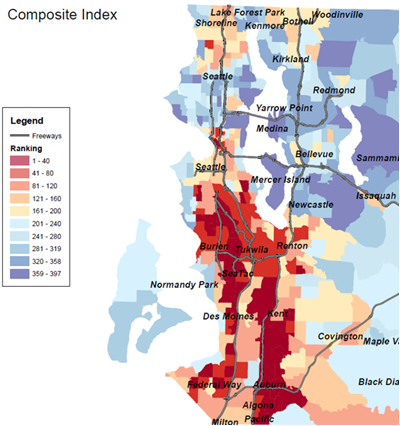King County to expand fight against obesity, new types of tobacco
Summary
A $9 million grant from the U.S. Centers for Disease Control and Prevention to Public Health – Seattle & King County will help support healthy communities by taking on the marketing of junk food, sugary sodas, and new tobacco products.
Story
King County will use a federal grant to coordinate a regional fight against obesity and tobacco by taking on the marketing of junk food, sugary sodas, and new tobacco products.Using a $9 million grant awarded by the U.S. Centers for Disease Control and Prevention, Public Health – Seattle & King County will lead a partnership of cities, school districts, community organizations, and businesses. The coalition will help local residents make healthy decisions, help schools provide healthier meals and more opportunities for exercise, and help cities design more bicycle- and pedestrian-friendly communities.
"We will use this grant to expand our collective fight against two of the leading causes of premature death—obesity and smoking," said King County Executive Dow Constantine. "Our proven ability to bring partners together to improve the health of our diverse communities is what set us apart in the competition for this grant.”
About the partnership
The partnership is designed to offer communities healthier food options and access to more recreational opportunities to overcome the effects of marketing that promotes high-calorie fast food, sodas, and tobacco products. Public health experts are concerned the rising popularity of new tobacco products—including e-cigarettes and hookah—could reverse the progress made in reducing the number of people who smoke, particularly young people.The three-year grant will fund the Partnership to Improve Community Health, or PICH, a collaboration led by Public Health – Seattle & King County, in partnership with Seattle Children’s and the Healthy King County Coalition.
The grant will support Executive Constantine’s effort to transform health and human services to focus on prevention. In particular, it will accelerate Communities of Opportunity, a partnership between King County and The Seattle Foundation designed to improve health, social, racial, and economic outcomes by focusing on specific places.
Unlike the traditional one-size-fits-all approach to programs, Communities of Opportunities engages people in the community to determine the particular local needs and allows them to take ownership of the effort.
We will use three approaches:
- Expanding successful nutrition, physical activity and tobacco prevention policies and strategies to reach more school districts, suburban cities, the business sector and the health care sector.
- Focusing efforts in communities with high-levels of need.
- Providing funds to community partners who will carry out the work.
Public Health has demonstrated recent success at leading coalitions. A federal report earlier this year found that a partnership between Public Health and school districts decreased youth obesity by 17 percent by boosting healthy habits among middle and high school students.
This fall, Public Health will issue a request for proposals for community agencies, schools, and local governments to apply for grant funds. Visit www.kingcounty.gov/health/communities for more information.

 Translate
Translate


